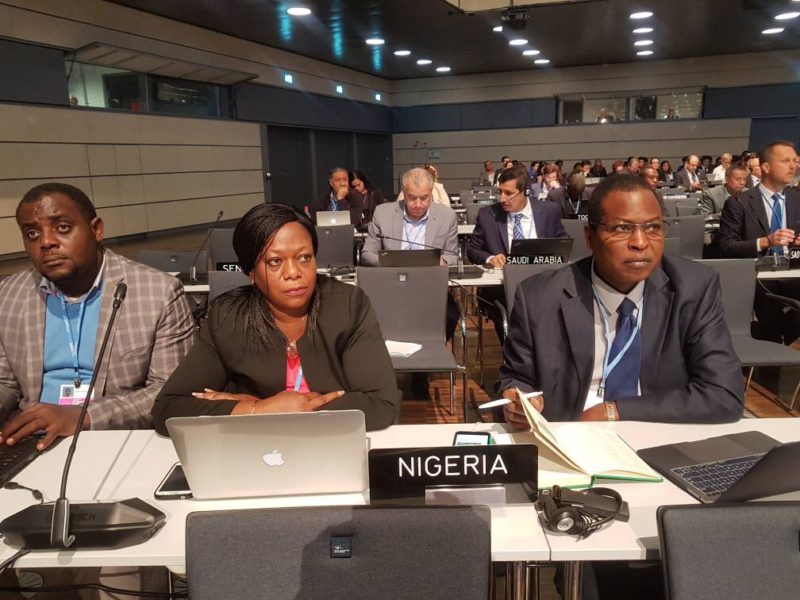Nigeria has welcomed the progress made in the first week of the ongoing intersessional climate talks under the United Nations Framework Convention on Climate Change (UNFCCC) taking place in Bonn, Germany from April 30 to 10 May, 2018.

Head of a four-man Nigerian delegation to the summit and Director, Department of Climate Change in the Federal Ministry of Environment, Dr Peter Tarfa, disclosed in a document made available to EnviroNews on Saturday, May 5, 2018 that the country was ready for constructive discussions in the next week to ensure progress in the Bonn session, which is aimed to further develop the guidelines needed to fully implement the Paris Climate Change Agreement, and also consider the outcome of the Talanoa Dialogue.
According to Tarfa, Nigeria’s stand, which aligns with that of the African Group of Negotiators, are that:
- A common timeframe is important to allow for clarity, transparency and agreeability of NDCs. The two hours at this session were not enough for Parties to exchange their views and engage on substantial elements in this Agenda item. To ensure that we don’t lose the progress made in this session. We recommend that an informal note is produced by the co-facilitators or an annex with elements discussed in this agenda item is attached to the procedural conclusions.
- Further work on the synergies between the two registries, through an in-session workshop to be held in Bangkok to allow Parties to exchange views on these two Agenda items to allow for further clarity.
- Extension of the mandate of the Consultative Group of Experts (CGE). The CGE is a critical body that has assisted countries to improve the reporting quality over the years. There is need for flexible to allow for the extension of the mandate of the CGE. Of course, conversion of this body into a permanent body of the Convention will be most welcome to Nigeria.
- Status of compilation, submission, synthesis and review of the national communications and biennial reports from Parties included in Annex I to the Convention. Five Parties have not submitted the documents that make the synthesis of the information contained in the national communications and biennial reports by the Secretariat incomplete. Future actions on the ambition to cut down emissions further will depend on the adequacy of information provided by Parties. Annex I Parties should lead by example in demonstrating discipline in adhering to the climate change multilateral treaty requirements.
- Nigeria welcomes progress on arrangements of intergovernmental meetings discussions. We hope further information regarding preparations of COP24/CMP14/CMA1.3 particularly plans to invite Heads of State and Government to Katowice will be provided early enough. We believe discussions on frequency of the sessions be held after 2020 when clarity of the implementation of Paris Agreement is clear.
Key focus of the meeting in Bonn entails making progress related to the completion of tasks concerning the implementation of the Paris Agreement (PA) known as Paris Agreement Work Programme (PAWP) and a set of decisions required to operationalise the Paris Agreement. The work is to be completed at the Katowice Climate Change Conference in December 2018, and a good technical progress will be required at the Bonn session to achieve the objective.
Related discussions in the negotiations focused on:
- Information that could improve the clarity, transparency, and understanding of NDCs (APA);
- Features of the NDCs (APA);
- Accounting for the NDCs (APA);
- The transparency framework for action and support, which includes reporting of greenhouse gas (GHG) emissions and financial support provided to developing countries (APA);
- Matters relating to the global stocktake (APA);
- Common timeframes for NDCs (SBI);
- Modalities and procedures for the NDC registry (SBI), and
- Agriculture (SBI and SBSTA).
Other important themes in the PAWP being discussed in Bonn include:
- The committee to facilitate implementation and promote compliance under the Paris Agreement (APA);
- Accounting of financial resources provided and mobilised through public interventions (SBSTA);
- Recognising developing countries’ adaptation efforts (SBI and SBSTA);
- Adaptation communication (APA);
- The forum on the impact of the implementation of response measures (SBI and SBSTA); and
- Cooperative approaches under Article 6 of the Paris Agreement, which include market and non-market based approaches (SBSTA).
A major issue in Bonn, the Talanoa Dialogue, is a global conversation about the efforts to combat climate change involving both parties and non-party stakeholders. The COP launched the Talanoa Dialogue at COP23 and established the “Fiji Momentum for Implementation,” a decision that gives prominence to pre-2020 implementation and ambition.
The Dialogue focuses on three questions related to countries’ efforts to combat climate change: Where are we? Where do we want to go? How do we get there? Its preparatory phase started in January 2018 and will last until December, followed by a political phase at the COP24 in Katowice, Poland.
In line with the decision of the COP that requested all parties to hold national dialogues, Nigeria plans to hold its National Dialogue after the Bonn session through assessment exercise under the Global Stocktaking Exercise of Climate Action of the United Nations Framework Convention on Climate Change.
According to Tarfa, all information gathered will feed into the UNFCCC global stocktaking portal where it will be highlighted in the UNFCCC Synthesis Report which will be released by the end of 2018.
He disclosed that a two-day national stakeholders’ Stocktaking dialogue on climate action would hold in Abuja between September and October 2018, and will also provide an opportunity for party and non-party stakeholders to discuss extensively on the progress of #ClimateActionNG, and available opportunities for improvement using the Talanoa Dialogue methodology.
